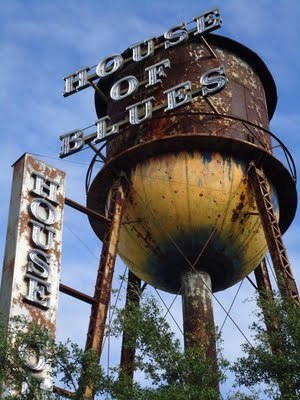Beth Kephart's Blog, page 242
May 19, 2011
Meet me at the BEA (3). Well, I just have to smile.

You know how I was just recently recalling my first BEA signing, where I stood (Bravely. Enduringly. Boldly. You'd Have Been Proud of Me.) next to Jodi Picoult—her long, long, long line of fans nearly out the door and my line, well, not so out the door?
This year, I recently discovered, I will be standing (Bravely. It Better Be Enduringly. Hopefully You'll Still Be Proud of Me.) again in the presence of greatness, as Megan McDonald, the creator of the adorable Judy Moody series, signs at a table near mine, at the very exact same time.
I'm going to be reporting on this and many other things—sending along brief videos of Egmont USA's Elizabeth Law and Greg Ferguson, say, or my early morning walk through the aisles—for the Armchair BEA series.
I am already smiling. (Bravely.)




Published on May 19, 2011 09:53
On earning out with Flow: The Life and Times of Philadelphia's Schuylkill River
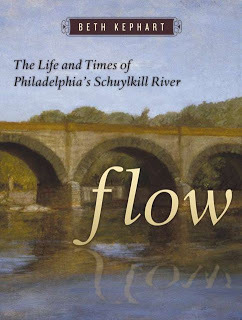 A few posts back, I showcased my $6.88 royalty check—a check received for my fifth memoiristic volume, Ghosts in the Garden. Ghosts went out of print shortly before that check made its way to me, but it earned out anyway, thanks to a small sale in South Korea and the many fans of Chanticleer garden, where that book takes place.
A few posts back, I showcased my $6.88 royalty check—a check received for my fifth memoiristic volume, Ghosts in the Garden. Ghosts went out of print shortly before that check made its way to me, but it earned out anyway, thanks to a small sale in South Korea and the many fans of Chanticleer garden, where that book takes place.Today I learned that Flow, my autobiography of the Schuylkill River, has also earned out its small advance in an equally small, but meaningful way, and I'm taking this moment to honor that—to honor these books of ours that don't slot easily into any proven category, that don't have a logical spot on Barnes & Noble shelves, that don't scream Bestseller to those who dare to take them on, and that find their right readers nonetheless. Flow is the book that most people laughed at before it was published, and Flow is also the book that changed my place in Philadelphia, this city I love.
I hear more about Flow than nearly any other book I've published. Not because it sold hugely—it didn't (though this one is still in print)—but because readers are smarter and more willing to stretch than many give them credit for. "I have no idea what this book is," Micah Kleit, Temple University Press editor, said to me, early on. "But we want to take the risk."
Thank you, Micah, Ann Marie Anderson, and Publicist Supreme Gary Kramer, for taking that risk with me, for giving me a book that I remain most proud of.
(And thanks, Karen Baker, for taking my call.)




Published on May 19, 2011 07:25
May 18, 2011
I'm thinking it's the weather
Published on May 18, 2011 14:59
Sweet Dreams/DeWitt Henry: Reflections
 As the founding editor of Ploughshares and the former Chair of Writing, Literature, and Publishing at Emerson College, DeWitt Henry has stirred, ushered, and promoted all manner of writerly dreams. He's put first stories into print and published the work of our greatest living (and sometimes not living) authors. He's sat in classrooms, seducing and exhorting. He's said to others, You can. You will.
As the founding editor of Ploughshares and the former Chair of Writing, Literature, and Publishing at Emerson College, DeWitt Henry has stirred, ushered, and promoted all manner of writerly dreams. He's put first stories into print and published the work of our greatest living (and sometimes not living) authors. He's sat in classrooms, seducing and exhorting. He's said to others, You can. You will. With his memoir, Sweet Dreams (Hidden River Press), Henry traces and comes nearly to terms with his own fantasies and emergent needs, as he tells the story of his rising and his wanting. Much of the book is devoted to a childhood and adolescence spent in the very swath of the suburban Philadelphia that I have, since my eighth-grade year at Radnor Middle School, called my own, and so I turned the pages of this book with acute interest, admiring the precision of Henry's recall—the stunning accuracy of descriptions about a place that has changed entirely and, then again, changed hardly at all.
I have (unknowingly) walked by two of Henry's childhood homes many a time; in Sweet Dreams the porches, yards, rooms, rooftops come alive with Henry's artist mother and alcoholic father, with siblings that struggled to find their own way, with episodes of generosity and scenes of terrible despair. I spent my time at Radnor High; DeWitt did, too, with peers whose last names are familiar to me. Henry walked among the ponds and water wheels and the majestic Walton Estate before it became Eastern University. I have walked there, too, plenty of times, taking photographs like the one above. The local movie theater can be found in Henry's pages, as can Eaglesmere, an outpost I have visited. Roadways and greenways and pause and hurry—it was then, it is now, and Henry brings it to vivid life.
Sweet Dreams is a coming-of-age book. It is a book about the boy who grew up with candy wealth, fell in love with a toy printing press, and decided, early on, to be a Writer. One can decide to be a Writer, but the world, in some ways, has to stand equal to that dream. It's a contest of wills, or it can be seen as one, and DeWitt takes us through the bruises and glories. He dreams out loud. We're there.
Here he is talking about the aforementioned Walton Estate (Walmarthon), now the heart of the Eastern University campus:
... Walton's was ten minutes or so away—you waded and pushed through overgrown bushes, ferns, and low hanging branches, with dankness, cobwebs, and with shade from the branches interlocking and arching above, while woodpeckers hammered, echoing, and cicadas whirred. You'd come out, then, following a creek, above the smaller of two ponds, set in the estate's open expanse of lawn, gardens, driveways and walks. A big white house, lived in, was to the left, far off were the gatehouse and wall, and far to your right, the castle-like mansion, deserted now.




Published on May 18, 2011 08:09
May 17, 2011
Meet me at the BEA (2)
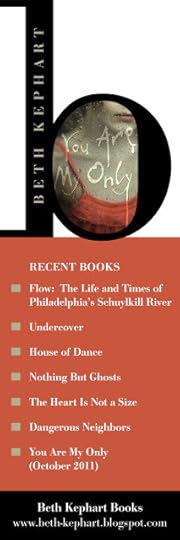 Thanks to the urging of my friend A.L. and the talents of my husband, W.R., I will now have these bookmarks to hand out during my Wednesday, May 25, 10 AM signing at the BEA.
Thanks to the urging of my friend A.L. and the talents of my husband, W.R., I will now have these bookmarks to hand out during my Wednesday, May 25, 10 AM signing at the BEA.I can't guarantee that my hair won't be wild (though I can promise that it won't be as wild as a certain dancing pro on a certain dancing show last evening). I can't guarantee that I won't, as in years past, be standing there in the autographing arena beside Jodi Picoult (guess whose line was longer? guess who managed through it?). But I can tell you that I'll be there, with galleys of You Are My Only (Egmont USA), and this fancy-schmancy bookmark.
Thanks to those of you who have written to say you've scheduled this signing in. I can't wait to see you.




Published on May 17, 2011 09:59
My good book fortune(s)
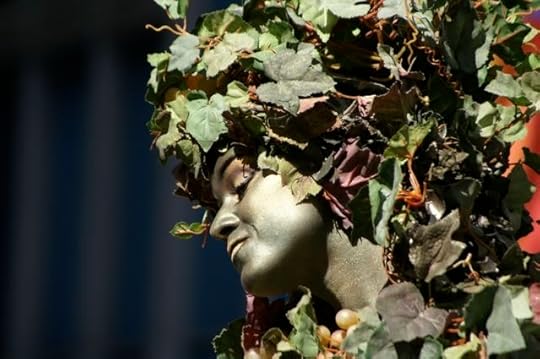 I'm not quite sure who this lovely lady is—Dionysus, I'm guessing—but I found her standing tall within a Philadelphia street festival, utterly and peaceably alone above the crowds (she was stilts-assisted). I return to her on this rainy morning because I feel her mood. Because I have looked out upon my pile of unread books and determined my short-term future.
I'm not quite sure who this lovely lady is—Dionysus, I'm guessing—but I found her standing tall within a Philadelphia street festival, utterly and peaceably alone above the crowds (she was stilts-assisted). I return to her on this rainy morning because I feel her mood. Because I have looked out upon my pile of unread books and determined my short-term future.Having just left Cleopatra (Stacy Schiff) in her tragic, epic Alexandria, I turn toward next titles. Some of them I've read before and will be re-reading. Some are brand-new both to the world and to me. Some are written by friends or friends of friends, one by a Pulitzer Prize winner who once surprised me with a glorious response to my Chicago Tribune review of her March, some by people I doubt I'll ever meet; two were gifts. I feel decadent, to be honest, to have found this time to read. But I have it; I'm claiming it; it will be forever mine.
My au courant (can I use that term this way?) book list, then:
Sweet Dreams, DeWitt Henry
When We Danced on Water, Evan Fallenberg (a Kindle book—about dance! about Berlin! Becca recommended!)
Dreamland Social Club, Tara Altebrando
Caleb's Crossing, Geraldine Brooks
A Heartbreaking Work of Staggering Genius, Dave Eggers
The Origin of Stories, Brian Boyd
Moments of Being, Virginia Woolf
The Liars' Club, Mary Karr
Touchy Subjects, Emma Donoghue
The Blue Flower of Forgetfulness, Cyrus Samii
The Boneshaker, Kate Milford
Stay tuned for my responses.




Published on May 17, 2011 06:31
May 16, 2011
The Ladies of the Gym
 Her name is Joy, and, oh baby, does she earn it. Steps right in beside me at Brenda's Zumba class and works that floor (works it, works it). It would be preposterous to guess her age (there are grandchildren involved and perhaps great-grandchildren), but she's got all the glamour of a movie star and a running stream of Joan Rivers humor, though Joy is elegant, perpetually, in her witticisms delivery.
Her name is Joy, and, oh baby, does she earn it. Steps right in beside me at Brenda's Zumba class and works that floor (works it, works it). It would be preposterous to guess her age (there are grandchildren involved and perhaps great-grandchildren), but she's got all the glamour of a movie star and a running stream of Joan Rivers humor, though Joy is elegant, perpetually, in her witticisms delivery.I've written of her here before. Written of Sarah, Betsy, Julia, of Brenda and (on other mornings) Andrea. They are my gym friends, my smack-the-air-down-with-me babes, my little bit of lift when I need lift, my salsa sweethearts, and I saw them today because I returned to Monday Zumba after a few too many weeks of worrying about the state of this house, this garden.
I belong here, I thought, when I was dancing with them. I belong beside Sarah, a former model, mind you, a knock out, who doesn't care one bit how her hair is flying or whether or not she's singing along in tune (though she is in tune, I swear it: whooo hoooo). I belong beside Betsy (the beauty queen from my high school and still so gorgeous, a woman with whom time has not interfered and a woman who still, after all these years, seems unaware of her own beauty) and I belong beside Joy, who basically split my ribs before I even started dancing with some story she was telling. I am far from the beauty these women are, but they have let me in, and I am standing proud beside them.
You want to know who I actually am? You come find me at the club. Being crazy and doing silly with the ladies of the gym




Published on May 16, 2011 16:40
On Cleopatra, the fine art of reading quality nonfiction, and graduation marches
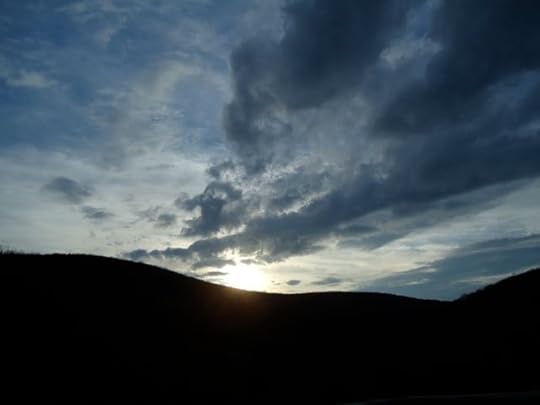 Thousands of years ago, as an undergraduate of the University of Pennsylvania, I craved and read nothing but nonfiction. My major was the History and Sociology of Science. My passion was the evolution and technology of cities, the genius lives of science-saints, Thomas Kuhn and his paradigms. I read history and biography and could not make time for fiction. I took no writing class and but a single English class (on the Romantic poets) and could not wait to be done with the stuff.
Thousands of years ago, as an undergraduate of the University of Pennsylvania, I craved and read nothing but nonfiction. My major was the History and Sociology of Science. My passion was the evolution and technology of cities, the genius lives of science-saints, Thomas Kuhn and his paradigms. I read history and biography and could not make time for fiction. I took no writing class and but a single English class (on the Romantic poets) and could not wait to be done with the stuff.I remained in that zone for many years, until fiction and poetry began to consume more space on my shelves, and until I began reading and (consequently) writing memoir. I don't make nearly enough room for classic nonfiction these days, but when I do, I'm returned to a happy place, and Stacy Schiff's Cleopatra is, at the moment, making me happy.
I bought this book for myself in December. I've read at least four dozen books in the meantime—many of them prescribed by my teaching. I've been burning through things and Cleopatra cannot be burned through. I take my time. I turn the (paper) pages.
I'm up to page 68 on this foggy day, and I'm going to stop right here, share a passage. Have you ever wondered what Alexandria was like in young Cleopatra's time—what she and Caesar looked out upon as they contemplated their strange, mysterious union? Let Schiff take you there:
From east to west the city measured nearly four miles, a wonderland of baths, theaters, gymnasiums, courts, temples, shrines, and synagogues. A limestone wall surrounded its perimeter, punctuated by towers, patrolled at both ends of the Canopic Way by prostitutes. During the day Alexandria echoed with the sounds of horses' hooves, the cries of porridge sellers or chickpea vendors, street performers, soothsayers, moneylenders. Its spice stands released exotic aromas, carried through the streets by a thick, salty sea breeze. Long-legged white and black ibises assembled at every intersection, foraging for crumbs.Oh, how I love this stuff.
I also love my own Penn students, some of whom are taking the graduation march today. Kim, Jonathan, Sara, Trixie, Ben, Lydia—my thoughts are with you on this steamy, atmospheric morning. Be well. Be safe. Travel widely. And write to me, every now and then, of your adventures.
The shimmer of this world awaits you.




Published on May 16, 2011 05:32
May 15, 2011
When Blogger Went Silent: A Reappraisal in the Aftermath
 A few days ago, as most everyone knows, Blogger went down for the count. Some posts were lost. Some comments vanished. And for what seemed like two days but might have been slightly less, Blogger users such as moi were banned from uploading new posts.
A few days ago, as most everyone knows, Blogger went down for the count. Some posts were lost. Some comments vanished. And for what seemed like two days but might have been slightly less, Blogger users such as moi were banned from uploading new posts.A quiet descended.
Call me strange (you won't be the first), but I suspect that the enforced stillness of the technical breakdown subtly changed the relationship many of us have with our blogs. Barred from access, we walked away. We were not, for that instant in time, chroniclers, newsmakers, heralders, opinion-istas. What we thought, we simply thought (or telegraphed in brief on Facebook or Twitter).
When Blogger repaired its many woes and let us bloggers back on line, I had the sensation I would sometimes get as a toweled-off child standing by the frothy shore. The waters seemed suddenly more brisk and more deep. I'd have to take a running plunge to feel that warmth and float again.
What is it, again, you were blogging about? I asked myself. What had you come to say? Who did you suppose was listening, after all? And how well have you been listening to others?
I've returned, obviously. I'm back, but I'm reassessing. What it is that I am doing here. What I want my own blog history to be.




Published on May 15, 2011 06:47
May 14, 2011
In Zanesville/Jo Ann Beard: Reflections
 Jo Ann Beard won our hearts with her autobiographical essays The Boys of My Youth, and while we've caught glimpses of her from time to time in the many intervening years (The New Yorker, Tin House), we've yearned for something book-length new. Wondered what it was that she had stewing. Waited, because what else can a reader do?
Jo Ann Beard won our hearts with her autobiographical essays The Boys of My Youth, and while we've caught glimpses of her from time to time in the many intervening years (The New Yorker, Tin House), we've yearned for something book-length new. Wondered what it was that she had stewing. Waited, because what else can a reader do? Turns out that Jo Ann Beard has been working on a story told by a precocious fourteen-year-old whose name we're never given. The book is called In Zanesville, and it is rich and stirring, tender and poignant, a rather remarkable brulee of old-time, back-then innocence and utterly sophisticated craft. Our heroine might not sound like most fourteen-year-olds (or, unfortunately, like many syllable-weary adults today), but she certainly lives like fourteen-year-olds once did—before texting, Facebook, and parentally controlled resumes, when kids actually got out and about in their sizable neighborhoods and scrambled their way after mewling cats and toward grown-up truths.
Kids back then had to figure things out for themselves. They had to deal with the alcoholic dad and the chain-smoking mom, the bad dinners, the demanding sister, the cheerleading squad, and the cans of beer at the bonfire. They had to lose their best friends before they could gain them back, and they didn't do it through peer meditation or Facebook flirtations. They did it face to face, phone to phone, or in silence.
You could sum this story up in a single sentence (complemented, perhaps by the sentences above): It's the tale of the narrator and her best friend, Flea. I'm not any such summation matters, though, for mostly what Beard gives us here is scenes—big, exploded, funny, both familiar and original, and only ever gently linked. Beard's biggest achievement is placing us inside the head of a young woman she clearly knows well, a young woman who talks and thinks like this:
I hate the phrase late bloomers. It sounds old fashioned and vaguely rank, like something a prairie woman would wear under her sweaty calico dress.
I like the way the clarinet sounds, like a clear cellophane ribbon unfurling, better than the flute, which has a narrow, harrassed sound.
Tonight the Zanesville Zephyrs are playing the Central Valley Voles, who always win, insulting everyone in Zanesville's idea of proper conduct for a school that is both poor and rural. They have rawboned, implacable players who trudge out on the field like coal miners going to work, and solid, unlovely cheerleaders who wear pants.
What is young adult literature? What is adult literature? I was never convinced, entirely, that the divisions matter.




Published on May 14, 2011 13:27

